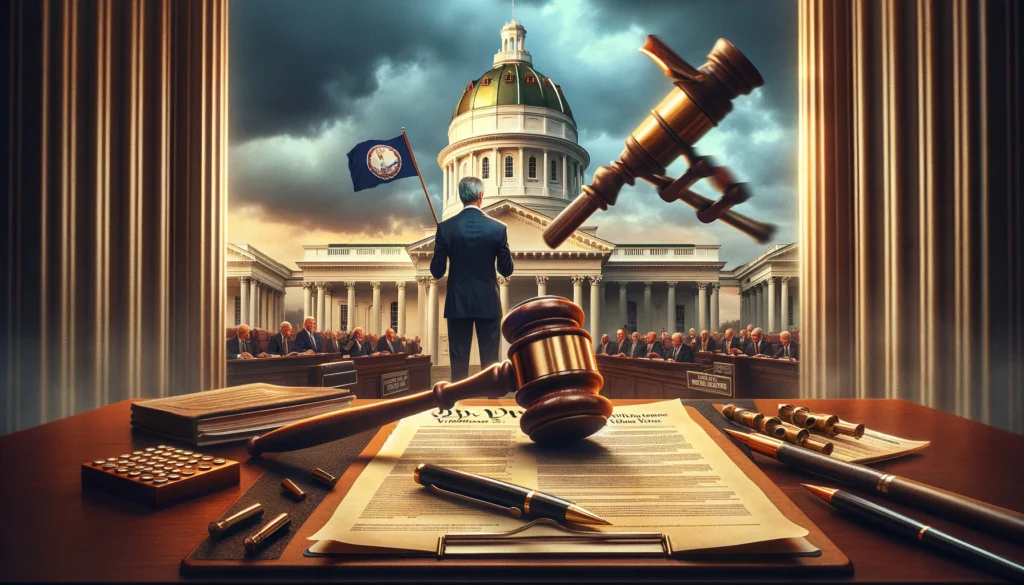In a decisive move that resonated throughout the Commonwealth of Virginia, Governor Glenn Youngkin took a firm stance on Tuesday by vetoing a comprehensive suite of 30 gun control bills, effectively cementing his role as a bulwark against the legislative ambitions of the Democrat-controlled legislature. This action marks a significant moment in Virginia’s political landscape, illustrating the ongoing tension between a governor committed to constitutional principles and a legislature that has been steering the state towards a more progressive agenda.
The series of vetoes comes at a time when Virginia finds itself at a political crossroads. Following years of Republican dominance, the state has witnessed a demographic and political shift, particularly in Northern Virginia, that has tilted the balance in favor of Democrats. This change was evident in the 2019 elections when Democrats gained full control of the legislature, emboldening them to pursue a series of legislative actions that align with far-left ideologies. However, the election of Youngkin in 2021, a victory that took many by surprise, signaled a pushback against this leftward momentum, with voters seemingly calling for a more moderate and balanced approach to governance.
Governor Youngkin’s opposition to the proposed gun control measures is rooted in a staunch defense of the Second Amendment rights of Virginians. In a statement, Youngkin emphasized his oath to defend both the United States Constitution and the Constitution of Virginia, which he interprets as encompassing the protection of the right to keep and bear arms for law-abiding citizens. Among the vetoed bills was one that sought to criminalize gun possession at public colleges. Youngkin criticized the bill for failing to consider Virginia’s diverse geographic and cultural landscape, arguing that individual colleges should retain the autonomy to set their own policies regarding firearms on campus.
Another notable bill that faced Youngkin’s veto was aimed at prohibiting home-based firearms dealers from operating near schools. The governor denounced this bill as being overly specific and potentially unconstitutional, suggesting it targeted a particular individual rather than addressing broader concerns about gun safety.
The governor’s vetoes also extended to legislation that would have imposed new restrictions on the process for obtaining a concealed carry permit, including a bill requiring fingerprint submission and another that sought to limit the use of widely recognized gun safety courses. Youngkin’s rationale for these vetoes was based on the belief that such measures were redundant, given existing background check processes, and infringed upon the rights of citizens who are known to be law-abiding.
Additionally, Youngkin took issue with a bill that proposed to criminalize the possession of firearms within 100 feet of voting locations, arguing that it would unduly complicate the ability of citizens to navigate public spaces, especially given the extended voting periods and multiple ballot box locations utilized in recent elections.
The governor’s sweeping vetoes have not only stopped these particular bills in their tracks but also underscored the broader ideological divide within the state’s political arena. Youngkin’s actions reflect a resistance to what he perceives as unconstitutional overreach by the legislature and a commitment to ensuring that any changes to gun laws are carefully considered and balanced against the rights of Virginians.
This standoff between the governor and the Democrat-controlled legislature highlights the complexities of governing a state that is deeply divided on issues of gun control and constitutional rights. As Virginia continues to navigate these contentious waters, the vetoes serve as a reminder of the delicate balance that must be struck between ensuring public safety and upholding the constitutional rights that form the bedrock of American democracy.
As Governor Youngkin continues to position himself as a “brick wall” against legislation he deems unconstitutional or overreaching, the path forward for Virginia’s lawmakers becomes increasingly challenging. With both sides of the aisle holding deeply entrenched views on the issue of gun control, the need for compromise and dialogue has never been more critical. The governor’s vetoes not only shape the immediate legislative landscape but also set the stage for a broader conversation about the direction in which Virginia, and indeed the country, should move when it comes to balancing safety, rights, and the diverse views of its citizens.



